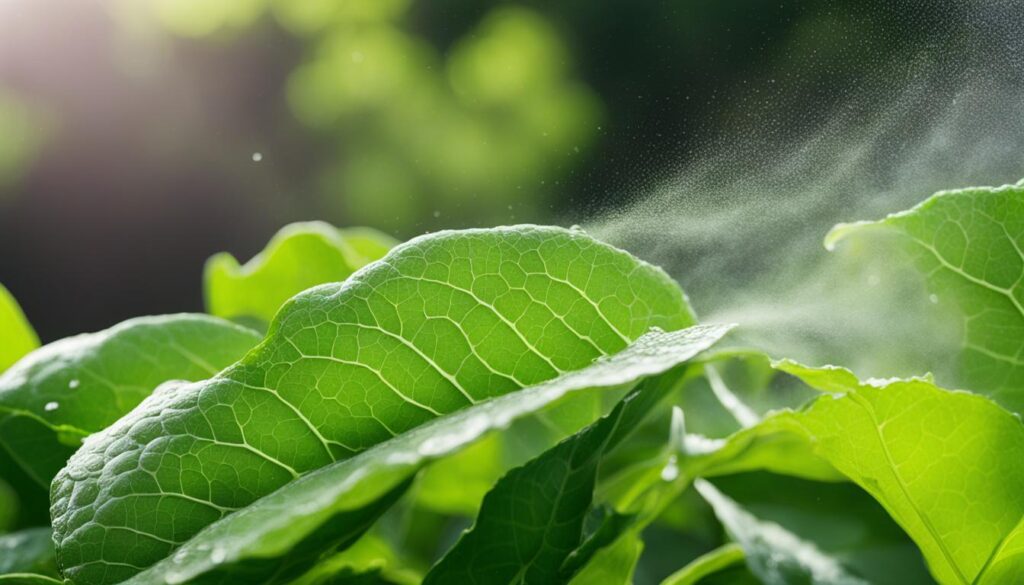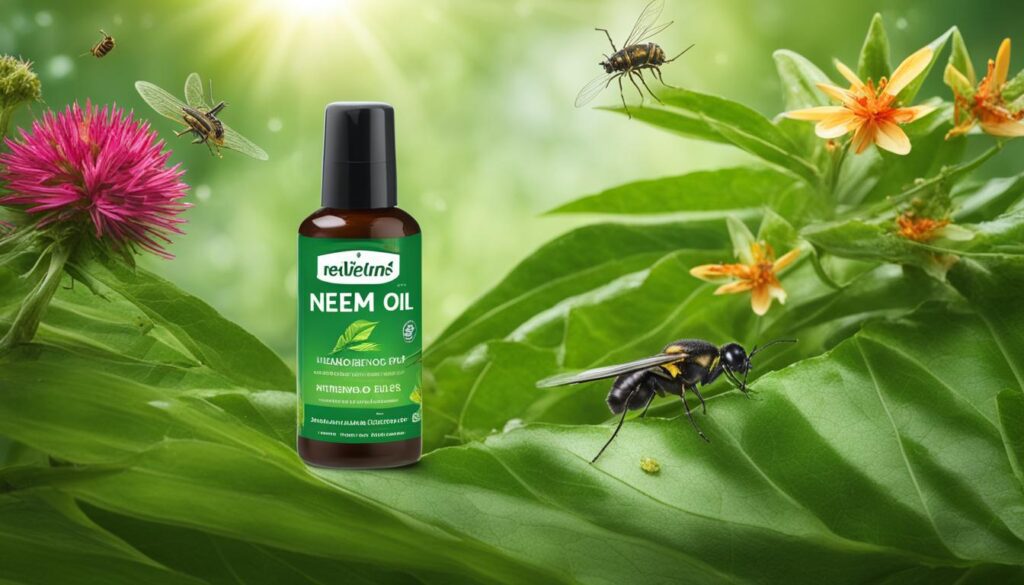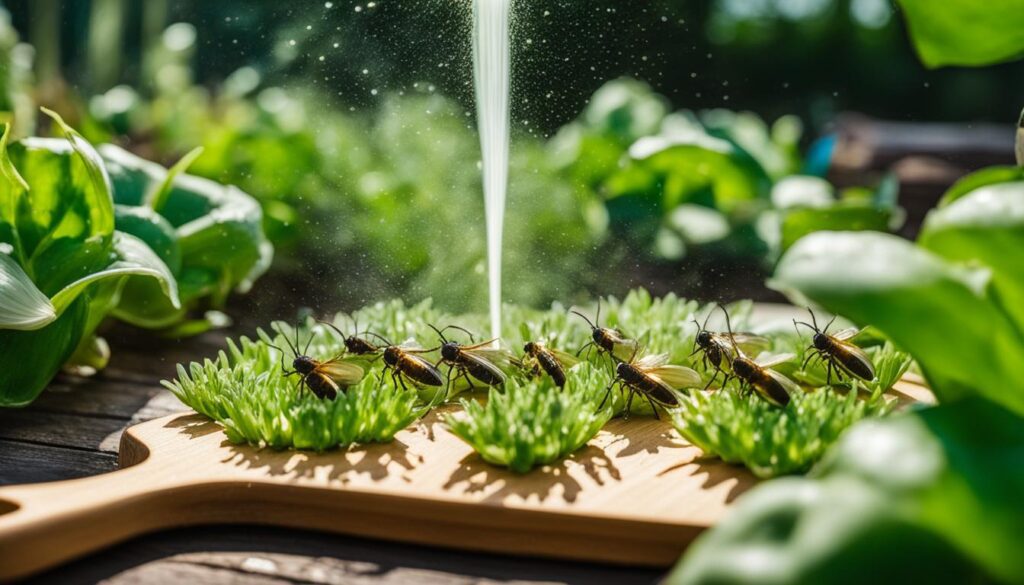Homemade bug sprays and deterrents are an effective and eco-friendly way to protect your prized plants from pests. From garlic and nettle sprays to neem oil and tomato leaf sprays, there are various all natural bug sprays that can ward off a range of pests including aphids, mites, thrips, and more. These homemade solutions not only help in controlling pests but also promote a healthy garden ecosystem. Additionally, practicing companion planting and enhancing plant diversity can further reduce the need for bug sprays.
Key Takeaways:
- All natural bug sprays are an effective and eco-friendly way to protect your plants from pests.
- Homemade bug sprays can ward off a range of pests including aphids, mites, and thrips.
- Using all natural bug sprays promotes a healthy garden ecosystem.
- Companion planting and enhancing plant diversity can reduce the need for bug sprays.
- Choose from various homemade bug spray recipes to suit your needs.
Insecticidal Soap for Effective Pest Control
Insecticidal soap, made from vegetable oil and dishwashing soap, is a popular and effective bug spray for treating a wide range of pests including aphids, lacebugs, leafhoppers, mealybugs, and thrips. The soap suffocates the insects by coating their bodies. It is recommended to dilute the soap mixture with warm water before applying to plants and do a patch test to ensure there is no damage. Insecticidal soap should be used as a short-term solution and combined with other preventive measures such as companion planting.
When using insecticidal soap, it is important to follow the instructions carefully to ensure its effectiveness. Here are some key points to consider:
- Mix the soap with warm water in the recommended ratio to achieve the right concentration.
- Apply the soap mixture to the affected plants, making sure to thoroughly cover both the tops and undersides of the leaves.
- Repeat the application every 7-10 days or as needed, especially if new infestations occur.
- Avoid spraying the soap mixture during the hottest part of the day to prevent leaf burn.
Using insecticidal soap in combination with other natural pest control methods like companion planting can help create a more balanced and pest-resistant garden. By incorporating these strategies into your gardening routine, you can effectively manage pests while minimizing the use of harmful chemicals.
Neem Oil Bug Spray for Organic Pest Management
When it comes to organic pest control, neem oil bug spray is a popular choice for gardeners seeking a natural and effective solution. Derived from the neem tree, this organic insecticide and fungicide has been used for centuries to combat a variety of garden pests. Its effectiveness against mites, whiteflies, aphids, thrips, and mealybugs, at all stages of their life cycle, makes it a versatile weapon in the fight against pests.
To create a neem oil bug spray, simply mix neem oil with water and a few drops of dish soap. This mixture can then be sprayed directly onto plant leaves, where it adheres and gets absorbed into the plant’s tissues. Not only does neem oil help control pests, but it also acts as a natural fungicide, making it an all-around beneficial addition to your pest management routine.
One of the advantages of using neem oil bug spray is its safety for beneficial insects and pets. Unlike synthetic pesticides, neem oil specifically targets pests while leaving predators like ladybugs and bees unharmed. It is also a great option for those practicing organic gardening, as it conforms to the principles of organic pest control.
In addition to its effectiveness against pests, neem oil bug spray can also be used as a root soak for treating root rot, further enhancing its value as a natural solution for gardeners. By incorporating neem oil bug spray into your arsenal of pest management strategies, you can maintain a healthy garden while minimizing the use of harmful chemicals.
Benefits of Neem Oil Bug Spray:
- Effective against a wide range of garden pests, including mites, whiteflies, aphids, thrips, and mealybugs
- Acts as a natural fungicide, helping to combat powdery mildew
- Safe for beneficial insects and pets, making it a suitable choice for organic gardening
- Can be used as a root soak to treat root rot
- Promotes a healthier garden ecosystem by reducing the need for synthetic pesticides
Vinegar Spray for Natural Pest Repellent
If you’re looking for a natural and effective way to repel pests in your garden, look no further than vinegar spray. Vinegar, a common household ingredient, can be used as a natural bug spray to keep aphids and other garden pests at bay. The acetic acid in vinegar acts as a natural repellent, making it an eco-friendly alternative to chemical-based pesticides.
To make vinegar spray, simply mix equal parts white vinegar and water in a spray bottle. Shake well to ensure the ingredients are thoroughly combined. Then, spray the mixture directly onto the affected plants, focusing on the areas where pests are present. Be sure to spray both the tops and undersides of the leaves for maximum effectiveness.
In addition to repelling aphids, vinegar spray can also deter ants and other scent-driven pests. The strong smell of vinegar masks the pheromones that ants use to communicate, discouraging them from entering your garden. For added scent and effectiveness, you can infuse the vinegar spray with a few drops of essential oil or add lemon peels to the mixture.
Garlic Spray for Natural Pest Repellent
If you’re looking for a natural and effective way to repel pests like aphids and slugs, garlic spray is a great solution. Not only does it help keep these unwanted visitors away from your plants, but it also promotes sustainable gardening practices. By harnessing the power of companion planting and the natural properties of garlic, you can create a homemade bug spray that is both eco-friendly and effective.
To make garlic spray, start by pureeing garlic bulbs with vegetable oil. Let the mixture sit overnight, then strain it and add mild liquid soap and water. This creates a potent spray that can be applied to plant leaves in the evening or every one to two weeks as a preventative measure. The strong scent of garlic acts as a natural deterrent, repelling pests and protecting your plants.
Another benefit of garlic spray is its compatibility with companion planting. Garlic and onions are known for their ability to repel insects when planted alongside susceptible plants. By incorporating garlic into your garden, you can create an ongoing supply of garlic spray while promoting a healthy and pest-free environment for your plants.
Benefits of Garlic Spray:
- Natural and eco-friendly pest repellent
- Repels aphids, slugs, and carrot flies
- Compatible with companion planting
- Promotes sustainable gardening practices
“Garlic spray is a great natural solution for repelling pests in the garden. Its strong scent deters unwanted insects, making it an effective and sustainable pest control option.”
Tomato Leaf Spray for Organic Pest Control
When it comes to organic pest control in your garden, tomato leaf spray is a powerful weapon against unwanted visitors. Tomato plants contain alkaloid compounds, such as tomatine, which have been found to be toxic to aphids and mites. By harnessing the natural properties of these leaves, you can create a homemade spray that effectively deters and eliminates pests without the need for harmful chemicals.
To make your own tomato leaf spray, simply gather chopped tomato leaves and steep them in water overnight. This allows the alkaloid compounds to infuse into the liquid. After straining the mixture, transfer it to a spray bottle for easy application. When spraying your plants, be sure to cover both the tops and bottoms of the leaves to ensure thorough coverage. This natural bug spray not only helps in controlling aphids and mites but is also a sustainable way to recycle tomato leaves pruned from your plants.
Using tomato leaf spray in your garden is an effective and eco-friendly method of pest control. Unlike synthetic pesticides, tomato leaf spray is safe to use around pets and beneficial insects, making it a sustainable choice for maintaining a healthy garden ecosystem. By incorporating this all-natural bug spray into your gardening routine, you can protect your plants from aphids and mites while promoting a more environmentally conscious approach to pest management.
Conclusion
Protecting your plants from pests can be achieved in an eco-friendly and sustainable way by using all natural bug sprays made from ingredients found in your pantry. These homemade insecticides offer a safe and effective alternative to toxic commercial products, ensuring that your garden remains healthy and vibrant.
By utilizing insecticidal soap, neem oil, vinegar, garlic spray, tomato leaf spray, and other homemade bug sprays, you can effectively control pests without harming beneficial insects or the environment. These natural solutions provide a much-needed balance, allowing you to maintain a flourishing garden ecosystem.
While these homemade bug sprays are a valuable tool in your pest control arsenal, it is essential to remember that they should be used as a short-term solution. To truly achieve eco-friendly pest control, it is crucial to implement preventive measures such as companion planting, promoting plant diversity, and practicing careful plant care.
By adopting these practices, you can not only safeguard your garden from pests but also contribute to a healthier and more sustainable gardening practice. Embracing natural bug sprays and homemade insecticides is a step towards creating a thriving garden that benefits both you and the environment.
Can Homemade Bug Spray for Plants Be as Effective as Store-Bought Options?
Many gardeners wonder if a homemade plant bug spray recipe can be as effective as store-bought options. While commercial products may offer convenience, homemade sprays using natural ingredients like garlic, neem oil, and vinegar can also effectively repel pests without harmful chemicals.
FAQ
Are homemade bug sprays effective for pest control?
Yes, homemade bug sprays can be effective in warding off pests from your plants. They are an eco-friendly and sustainable alternative to toxic commercial insecticides.
What pests can homemade bug sprays control?
Homemade bug sprays made from ingredients like garlic, neem oil, vinegar, and tomato leaf can help control a range of pests including aphids, mites, thrips, and more.
How frequently should homemade bug sprays be applied?
Homemade bug sprays can be applied every one to two weeks, depending on the severity of the pest infestation. It is important to monitor your plants and reapply as needed.
Can homemade bug sprays harm beneficial insects?
In general, homemade bug sprays made from natural ingredients are safe for beneficial insects when used as directed. However, it is always a good practice to avoid spraying directly on beneficial insects if possible.
Can homemade bug sprays be used on all types of plants?
Homemade bug sprays can be used on most plants, including vegetables, fruits, herbs, and ornamental plants. However, it is always recommended to do a patch test on a small area of the plant before applying the spray more broadly.
Are homemade bug sprays a long-term solution for pest control?
Homemade bug sprays should be used as a short-term solution for pest control. It is important to combine the use of homemade bug sprays with preventive measures like companion planting, plant diversity, and proper plant care to maintain a healthy garden ecosystem.












